 W
WAusten's brown hornbill is a species of hornbill found in forests from northeastern India and south to Vietnam and northern Thailand. It is sometimes included as a subspecies of Tickell's brown hornbill.
 W
WThe Baikal bullfinch, also known as the grey bullfinch, grey-headed bullfinch or great bullfinch, is a small passerine bird in the finch family Fringillidae. It is found in eastern Kazakhstan, Mongolia and adjacent areas of Russia and China. Although sometimes considered a full species, most authorities treat it a subspecies of the Eurasian bullfinch. It migrates altitudinally from its summer breeding range in the Altai Mountains to its winter range in the adjacent foothills and plains.
 W
WThe black robin or Chatham Island robin is an endangered bird from the Chatham Islands off the east coast of New Zealand. It is closely related to the South Island robin. It was first described by Walter Buller in 1872. The binomial commemorates the New Zealand botanist Henry H. Travers (1844–1928). It is also known as kakaruia (Māori) or karure (Moriori). Unlike its mainland counterparts, its flight capacity is somewhat reduced. Evolution in the absence of mammalian predators made it vulnerable to introduced species, such as cats and rats, and it became extinct on the main island of the Chatham group before 1871, being restricted to Little Mangere Island thereafter.
 W
WThe black-tailed crake is a species of bird in the family Rallidae. It is found in Bangladesh, Bhutan, China, India, Laos, Myanmar, Nepal, Thailand and Vietnam.
 W
WBlanford's rosefinch or the crimson rosefinch, is a species of finch in the family Fringillidae. It is found in Bhutan, China, India, and Nepal. Its natural habitat is boreal forest.
 W
WBolle's pigeon is a species of the genus Columba of family Columbidae, doves and pigeons, endemic to the Canary Islands, Spain. This bird is named after the German naturalist Carl Bolle, who was the first to distinguish it from the laurel pigeon. This wood pigeon is endemic to the laurel forest habitat.
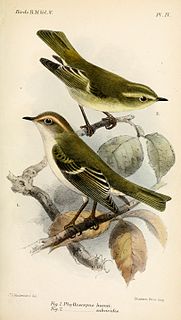 W
WBrooks's leaf warbler is a species of Old World warbler in the family Phylloscopidae.
 W
WThe Cebu hanging parrot is a subspecies of the Philippine hanging parrot found only on the island of Cebu, Philippines. This subspecies was generally believed to be extinct until an expedition led by the Department of Environment and Natural Resources (Cebu) claimed to have seen and captured a tiny bird in thick foliage in the remote part of central Cebu. The bird has a distinctive scarlet tail with faint patches of red on its head. Females lack the red throat and breast patch, as opposed to males. The nape and upper back are green-tinged and only lightly golden-yellow. They have a high-pitched, whistle-like sound. The bird measures 14 cm (5.5 in) long with a wingspan of 18 cm (7 in).
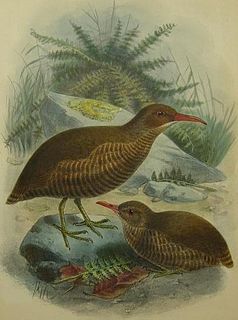 W
WThe Chatham rail is an extinct flightless species of bird in the family Rallidae. It was endemic to Chatham, Mangere and Pitt Islands, in the Chatham archipelago of New Zealand.
 W
WThe Cyprus warbler is a typical warbler which breeds only on Cyprus. This small passerine bird is a short-distance migrant, and winters in Israel, Jordan and Egypt.
 W
WThe Persian nuthatch or the eastern rock-nuthatch is a species of bird in the family Sittidae. It is found in Afghanistan, Armenia, Azerbaijan, Georgia, India, Iran, Iraq, Kazakhstan, Pakistan, Russia, Tajikistan, Turkey, and Turkmenistan.
 W
WElliot's pheasant, is a large pheasant native to south-eastern China.
 W
WThe flame-throated sunangel or little sunangel is a species of hummingbird. It is found in Ecuador and Peru. Its natural habitat is subtropical or tropical moist montane forest.
 W
WThe great spotted kiwi, great grey kiwi or roroa is a species of kiwi endemic to the South Island of New Zealand. The great spotted kiwi, as a member of the ratites, is flightless. It is the largest of the kiwi. The rugged topography and harsh climate of the high altitude alpine part of its habitat render it inhospitable to a number of introduced mammalian predators, which include dogs, ferrets, cats, and stoats. Because of this, populations of this species have been less seriously affected by the predations of these invasive species compared to other kiwi. Nonetheless, there has been a 43% decline in population in the past 45 years, due to these predators and habitat destruction. This has led it to be classified as vulnerable. There are less than 16,000 great spotted kiwis in total, almost all in the more mountainous parts of northwest Nelson, the northwest coast, and the Southern Alps. A minority live on island reserves.
 W
WThe Haast's eagle is an extinct species of eagle that once lived in the South Island of New Zealand, commonly accepted to be the pouakai of Maori legend. The species was the largest eagle known to have existed, with an estimated weight of 15 kilograms (33 lb) nearly double that of the Harpy eagle at 9 kilograms (20 lb). Its massive size is explained as an evolutionary response to the size of its prey, the flightless moa, the largest of which could weigh 230 kg (510 lb). Haast's eagle became extinct around 1400, after the moa were hunted to extinction by the first Māori.
 W
WHudson's black tyrant is a species of bird in the family Tyrannidae. It is named after Argentine-British ornithologist William Henry Hudson.
 W
WHume's bush warbler is a species of bush warbler. It was formerly included in the "Old World warbler" assemblage.
 W
WHume's hawk-owl or Hume's boobook is a species of owl in the family Strigidae endemic to the Andaman Islands. Its natural habitats are subtropical or tropical moist lowland forests and subtropical or tropical mangrove forests. It is becoming rare due to habitat loss.
 W
WHume's wheatear is a species of bird in the family Muscicapidae. It is found in Afghanistan, Bahrain, India, Iran, Iraq, Kuwait, Oman, Pakistan, Qatar, and the United Arab Emirates.
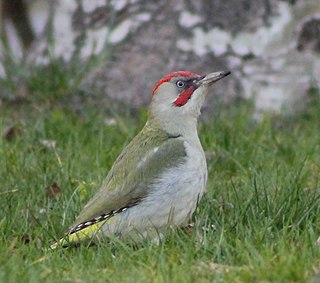 W
WThe Iberian green woodpecker is a medium-sized woodpecker endemic to the Iberian peninsula. It was formerly considered as a subspecies of the European green woodpecker but differs in having little black on the head and a dusky rather than a black ring around each eye.
 W
WThe Indian scimitar babbler is an Old World babbler. It is found in peninsular India in a range of forest habitats. They are most often detected by their distinctive calls which include an antiphonal duet by a pair of birds. They are often hard to see as they forage through dense vegetation. The long curve yellow, scimitar-shaped bills give them their name. It has been treated in the past as subspecies of the white-browed scimitar babbler which is found along the Himalayas but now separated into two species, the peninsular Indian species and the Sri Lanka scimitar babbler.
 W
WThe Legge's flowerpecker or white-throated flowerpecker is a small passerine bird. It is an endemic resident breeder in Sri Lanka. It is named after the Australian ornithologist William Vincent Legge.
 W
WThe long-billed bush warbler is a species of Old World warbler in the family Locustellidae. It is found in China, India, Pakistan, and Tajikistan. It is also known as Long-billed grasshopper warbler.
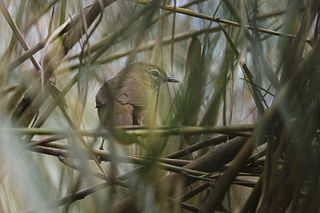 W
WThe marsh babbler is a member of the family Pellorneidae. The marsh babbler is endemic to the Brahmaputra floodplain, its associated tributaries and adjacent hill ranges in Assam, Arunachal Pradesh and Meghalaya in India and eastern Bangladesh.
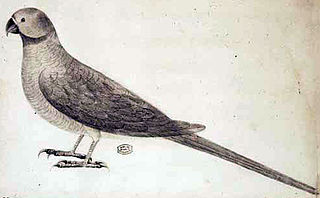 W
WNewton's parakeet, also known as the Rodrigues parakeet or Rodrigues ring-necked parakeet, is an extinct species of parrot that was endemic to the Mascarene island of Rodrigues in the western Indian Ocean. Several of its features diverged from related species, indicating long-term isolation on Rodrigues and subsequent adaptation. The rose-ringed parakeet of the same genus is a close relative and probable ancestor. Newton's parakeet may itself have been ancestral to the endemic parakeets of nearby Mauritius and Réunion.
 W
WThe olive-colored white-eye, also known as the olive white-eye, Yap olive white-eye or great Yap white-eye, is a species of bird in the family Zosteropidae.
 W
WThe orange fruit dove, also known as flame dove, is a small, approximately 20 cm (8 in) long, short-tailed fruit-dove in the family Columbidae. One of the most colorful doves, the male has a golden olive head and elongated bright orange "hair-like" body feathers. The golden-olive remiges are typically covered by the long orange wing coverts when perched. The legs, bill and orbital skin are bluish-green and the iris is whitish. The female is a dark green bird with blackish tail and orange-yellow undertail coverts. The young resembles females.
 W
WThe Palau cicadabird is a species of bird in the family Campephagidae. It is endemic to Palau. It was previously considered conspecific with the common cicadabird. Its natural habitat is subtropical or tropical moist lowland forest.
 W
WThe Palau ground dove is a species of bird in the family Columbidae. It is endemic to Palau, living in forests. The IUCN has assessed it as an endangered species.
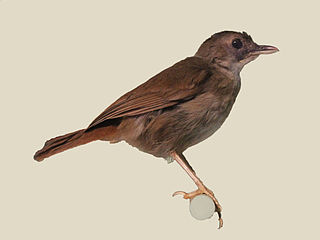 W
WThe pale-breasted illadopsis is a species of bird in the family Pellorneidae. It is found throughout the African tropical rainforest. Its natural habitats are subtropical or tropical moist lowland forest and subtropical or tropical moist montane forest.
 W
WThe Persian shearwater is a seabird in the family Procellariidae formerly lumped in with Audubon's shearwater.
 W
WThe Philippine tailorbird is a species of bird formerly placed in the "Old World warbler" assemblage, but now placed in the family Cisticolidae. It is native to the western Philippines.
 W
WThe plain white-eye is a species of bird in the family Zosteropidae. It is endemic to Yap.
 W
WThe plumbeous hawk is a species of bird of prey in the family Accipitridae. It is found in Colombia, Ecuador, Panama, and Peru. Its natural habitat is subtropical or tropical moist lowland forests. It is threatened by habitat loss.
 W
WThe red-cheeked wattle-eye is a species of bird in the family Platysteiridae. It is found in Cameroon, Ivory Coast, Ghana, Guinea, Liberia, Nigeria, Sierra Leone, and Togo. Its natural habitat is subtropical or tropical moist lowland forests.
 W
WThe red-fronted antpecker is a species of songbird found in Western Africa. Like all antpeckers, it is tentatively placed in the estrildid finch family (Estrildidae). It often contains the eastern Jameson's antpecker as a subspecies.
 W
WThe reed parrotbill is a species of bird in the family Paradoxornithidae. It is found in Manchuria and eastern China and the Russian Far East. It is threatened by habitat loss.
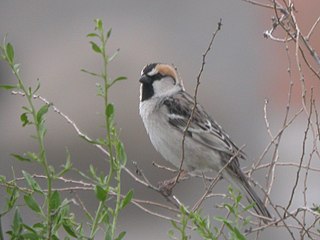 W
WThe saxaul sparrow is a passerine bird of the sparrow family Passeridae, found in parts of Central Asia. At 14–16 centimetres (5.5–6.3 in) and 25–32 grams (0.88–1.13 oz), it is among the larger sparrows. Both sexes have plumage ranging from dull grey to sandy brown, and pale brown legs. Females have less boldly coloured plumage and bills, lacking the pattern of black stripes on the male's head. The head markings of both sexes make the saxaul sparrow distinctive, and unlikely to be confused with any other bird. Vocalisations include a comparatively soft and musical chirping call, a song, and a flight call.
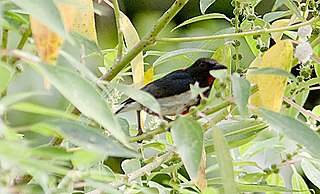 W
WThe scarlet-collared flowerpecker is a member of the family Dicaeidae, about 10 cm long and is endemic to the Philippines.
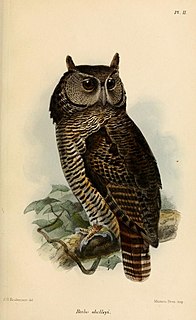 W
WShelley's eagle-owl is a species of owl in the family Strigidae. Despite its large size, it is a very little-known, rarely studied owl that seems to occur in very small numbers.
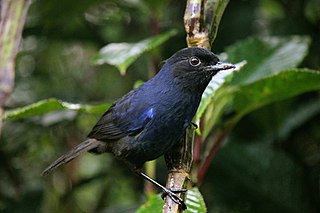 W
WThe Sri Lanka whistling thrush is a whistling thrush in the family Muscicapidae. It is a resident endemic bird in Sri Lanka.
 W
WThe Sri Lanka white-eye is a small passerine bird in the white-eye family. It is a resident breeder in forests, gardens and plantations which is endemic to Sri Lanka, mainly in the highlands.
 W
WThe Sulawesi myzomela is a species of bird in the family Meliphagidae. It is endemic to Indonesia where it occurs in Sulawesi, Taliabu, Selayar and Tanah Jampea. Its natural habitats are subtropical or tropical moist lowland forests, subtropical or tropical mangrove forests, and subtropical or tropical moist montane forests.
 W
WThe sulphur-vented whistler or sulphur-bellied whistler is a species of bird in the family Pachycephalidae. It is endemic to Sulawesi in Indonesia. Its natural habitats are subtropical or tropical moist lowland forest and subtropical or tropical moist montane forest.
 W
WThe Tibetan serin or Tibetan siskin is a true finch species.
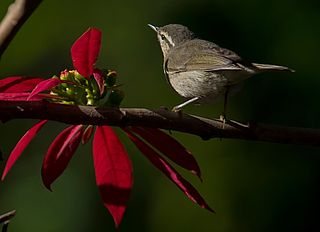 W
WThe Tytler's leaf warbler is a songbird species. Like all leaf warblers, it was formerly placed in the "Old World warbler" assemblage, but now belongs to the new leaf-warbler family Phylloscopidae.
 W
WThe white-browed bush chat, also known as Stoliczka's bushchat, is an Old World flycatcher in the genus Saxicola. The alternative name is after the discoverer, geologist and explorer Ferdinand Stoliczka.
 W
WThe white-rumped falcon is a species of bird of prey in the family Falconidae native to Indochina. It is sometimes placed in its own monotypic genus, Neohierax.
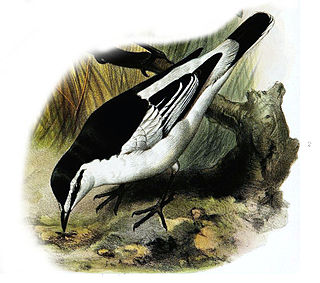 W
WThe white-rumped triller is a species of bird in the family Campephagidae. It is endemic to Sulawesi in Indonesia. Its natural habitats are subtropical or tropical moist lowland forest and subtropical or tropical mangrove forest.
 W
WThe Yap cicadabird, sometimes considered to be a distinctive subspecies of the common cicadabird, is a species of bird in the cuckooshrike family, Campephagidae. It is endemic to Yap, a small island cluster in the western Caroline Islands, and part of the Federated States of Micronesia in the western Pacific Ocean. It inhabits the dry tropical forest there.
 W
WThe yellow-bellied whistler, or Philippine whistler, is a species of bird in the family Pachycephalidae that is endemic to the Philippines.
 W
WThe yellow-faced flameback is a species of bird in the family Picidae. It is found on the Philippine islands of Negros, Guimaras, Panay, Masbate, and Ticao. It is sometimes considered a subspecies of the greater flameback.